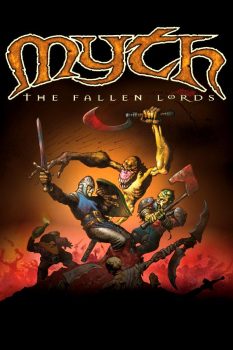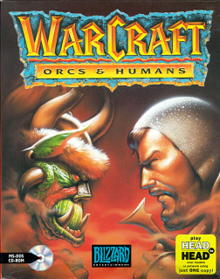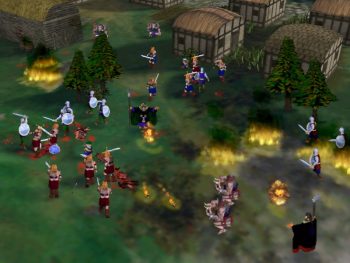Looking Back at RTS – and Myth: The Fallen Lords
 So….one of the rabbit holes I periodically jump down is Total War: Warhammer II. That’s easily my favorite in the Total War series (I played a boatload of TW: I as well. You can use units from I, in II, in some campaigns, which increases the utility of the first game. I appreciate that.
So….one of the rabbit holes I periodically jump down is Total War: Warhammer II. That’s easily my favorite in the Total War series (I played a boatload of TW: I as well. You can use units from I, in II, in some campaigns, which increases the utility of the first game. I appreciate that.
I struggle with the first 15-or-so turns, and frequently abandon a new game, pick another faction, and try again. I like playing different factions, so that’s fine. Also, I often plateau around 70-75 turns, and start a new game as well.
I reinstalled TW: I and II last month and have been playing again. It’s been fun. After a half-dozen false starts, I’m having one of my most successful games leading a chivalry-based, Middle Ages-type faction (WH is a fantasy world, with elves, orcs, beastmen, etc). And I realized I was applying the principles that George Washington advised America about in his famous Farewell Address. Being a Constitutional Convention of 1787 wonk, I’m reasonably familiar with Washington, who presided over the Convention.
However, as I type this right now, it is obvious that such a post is definitely not gonna be ready for tomorrow morning (which would be when this one went live – Monday the 3rd.
And let met tell you, there are multiple elements of Washington’s Address that apply today. Including about people in the country undermining it by pitting one group against another. And that applies to quite a few groups/people…
So instead, we’re talking about a few Real Time Strategy (RTS) games I’ve played over the years. The basic definition of RTS is games that don’t move forward incrementally in turns, but move along in ‘real time.’
The old Warcraft: Orcs and Humans was the first one I really got into, way back in the mid-nineties, which was the birth era of RTS. I never played World of Warcraft, but I ate up the first two Warcraft games (Starcraft followed, and was also immensely popular, but I never tried that one).
 I think I played Command and Conquer for a very short time, but I don’t really remember that. It was kind of a high point of that style of RTS.
I think I played Command and Conquer for a very short time, but I don’t really remember that. It was kind of a high point of that style of RTS.
Age of Empires came along a few years later, and I played the heck out of that, as well as Age of Empires II. Both got rehabs and updates, and AoE II is totally playable. A buddy of mine is still addicted to the new version. AoE II is a classic which is still growing.
A few years ago, my son and I played a LOT of Star Wars: Empire at War, which came out in 2006. It swapped out resource gathering with a point-of-control system. It is a ton of fun.
For a Tolkien fan, Battle for Middle Earth I was fantastic. I didn’t play II, which I’ve heard was even better. It is possible to find an updated version of II that runs on modern Windows, but I haven’t managed to make that happen. Might really dial in on it sometime, and try. It was REALLY good for Tolkien fans.
There was a decent-enough D&D knock-off version, Dragonshard, in 2005. It mixed in a bit more RPG elements. I played it some, but Battle for Middle Earth was definitely superior.
Sid Meier is possibly the greatest game-creator of all time, with Civilization one of the most influential and popular games ever. His first game after leaving MicroProse was Sid Meier’s Gettysburg!, and it is a terrific Civil War game. You need to be totally immersed in it, but it’s a great Civil War game. Sid Meier’s Antietam! was similar.
And Railroad Tycoon was the standard railroad sim for a long time. 2018’s Railway Empire was a blast, and I have played that a fair amount.
I think it’s definitely cool that RTS is not limited to combat games (there are RTS World War games as well – I’ve only dabbled in those). Tropico, and Sim City, are two examples of RTS-type city-building games. I played a LOT of the first Tropico – that’s a fun game.
 The only game that rivals TW:WH II for me, came out WAAAY back in 1997. Man, how can that be almost 30 years ago? I feel really old. But Bungie’s Myth: The Fallen Lords, was a terrific achievement. Story and game-play: just the EXPERIENCE.
The only game that rivals TW:WH II for me, came out WAAAY back in 1997. Man, how can that be almost 30 years ago? I feel really old. But Bungie’s Myth: The Fallen Lords, was a terrific achievement. Story and game-play: just the EXPERIENCE.
The land has fallen under almost total control of the forces of darkness (The Fallen Lords), led by Balor. The Light is led by powerful sorcerers, and you control an elite army unit called The Legion. You need to overcome The Fallen Lords. The developers cited Mel Gibson’s Braveheart, and Glen Cook’s fantastic The Black Company (you surely read my interview with him, here), as inspirations.
It is actually an RTT (Real Time Tactical) game. No resource gathering, no settlement growing. You don’t develop skill trees and build up unit strength. You start each scenario with your force fully ready to go.
It was essentially a unit-based combat game (NOT turn-based). But playing it still felt like a combat-based RTS, back then. Terrain and weather impacted things, which was neat at the time. You controlled units (usually in groups) to win battles. And no game I ever played had friendly fire as such a part of it. Those dwarven Molotov cocktails could take out your own forces.
Project Magma has converted the game to operate on current Windows systems. If I could focus in on it, I would probably go through the multiple steps and play this again. But TW: WH I, and II, are already installed, ready to play, and twenty years newer. Still, Myth Lords is one I’m tempted to try.
There was a sequel, and a prequel. But that original game is a masterpiece.

Bob Byrne’s ‘A (Black) Gat in the Hand’ made its Black Gate debut in 2018 and has returned every summer since.
His ‘The Public Life of Sherlock Holmes’ column ran every Monday morning at Black Gate from March, 2014 through March, 2017. And he irregularly posts on Rex Stout’s gargantuan detective in ‘Nero Wolfe’s Brownstone.’ He is a member of the Praed Street Irregulars, founded www.SolarPons.com (the only website dedicated to the ‘Sherlock Holmes of Praed Street’).
He organized Black Gate’s award-nominated ‘Discovering Robert E. Howard’ series, as well as the award-winning ‘Hither Came Conan’ series. Which is now part of THE Definitive guide to Conan. He also organized 2023’s ‘Talking Tolkien.’
He has contributed stories to The MX Book of New Sherlock Holmes Stories — Parts III, IV, V, VI, XXI, and XXXIII.
He has written introductions for Steeger Books, and appeared in several magazines, including Black Mask, Sherlock Holmes Mystery Magazine, The Strand Magazine, and Sherlock Magazine.
“I realized I was applying the principles that George Washington advised America about in his famous Farewell Address.”
No entangling foreign alliances, eh?
Ha!! Nice job picking up the reference.
Foreign entanglements can be a huge part of the early game. Trade Agreements are great, to generate vital revenue. But it’s easy to agree to a Defensive, or Military, Alliance, with an existing ally. MAN, that can pull you into war with a faction quicker than you know.
And suddenly you’re stretched too thin, and the plans you were pursuing have to be put on hold or tossed out the window, as you deal with a threat/problem that wasn’t on your radar until you created it yourself. And sometimes, you simply get your butt kicked by a faction you don’t even need to be fighting yet.
You don’t ‘pay off debt’ per se, but you have to mange finances to have a positive revenue stream. If you go negative cash balance, there are negative impacts – no credit available in this game.
Though you can go raze or loot a nearby settlement for quick cash. Or, attack it and take it over, giving you a new source of revenues. That may start a war with another faction, of course!
And you are faced with a ‘guns or butter’ dilemma of sorts. War is expensive. You need standing armies, but they drain the coffers. And the technologies you develop, and the buildings in your settlements, offer you different options and functions.
Generate revenue, maintain public order, defense – expanded or stronger military units – you decide where to invest.
My latest game, I’m basically running a Middle Ages-type faction of crusader knights. You could even tie in Washington’s comments that we need religion as well, to stretch it – but that just happens to be built into a couple factions. Though, there are temple buildings for different factions.
But I’m having some greater-than-normal success, by intentionally following George’s advice – especially foreign entanglements.